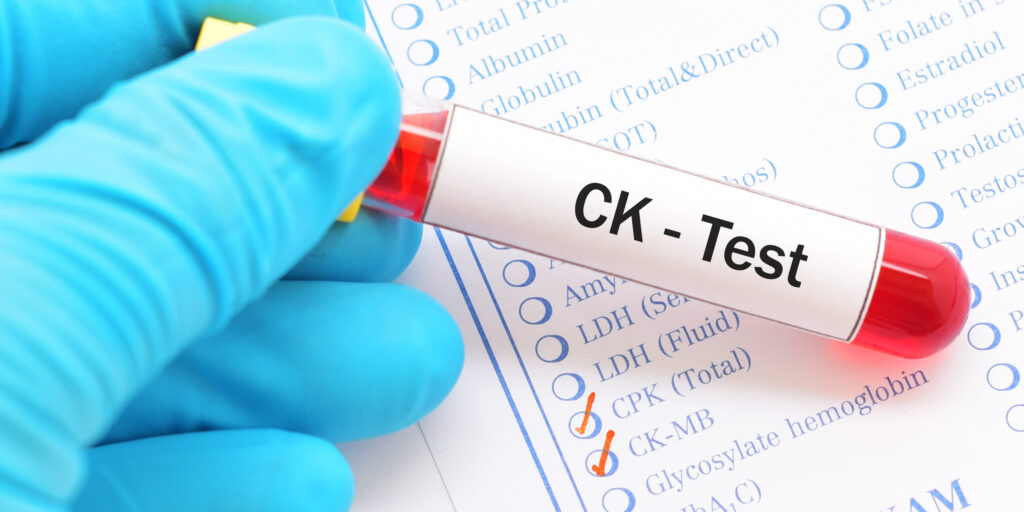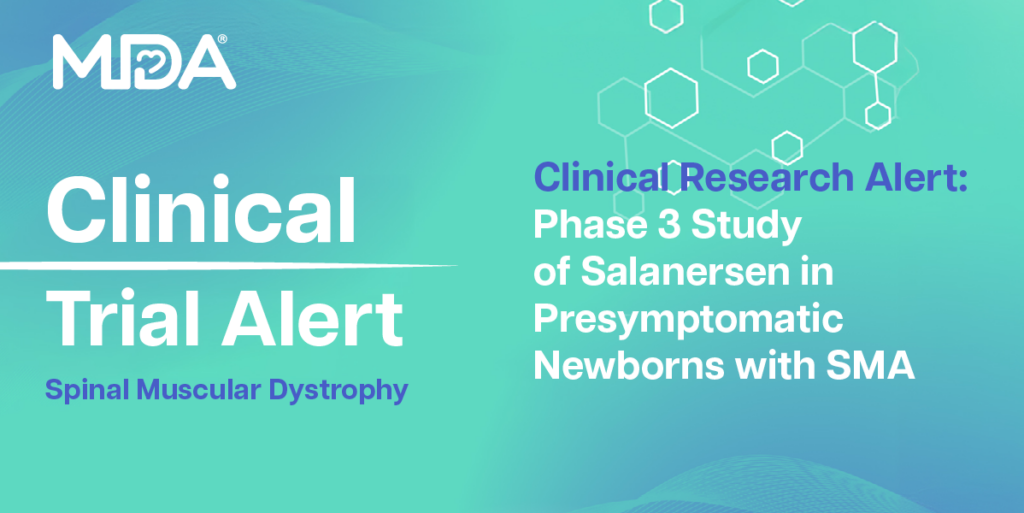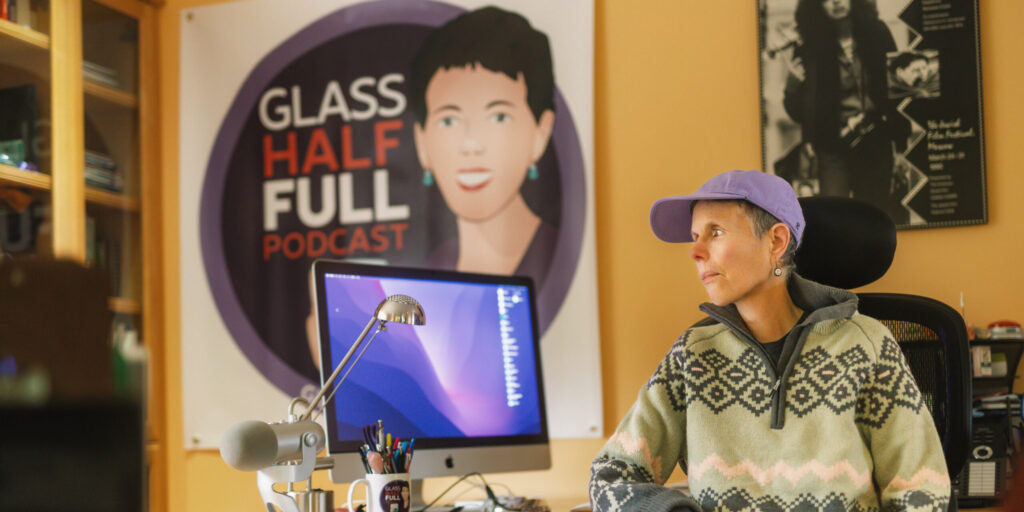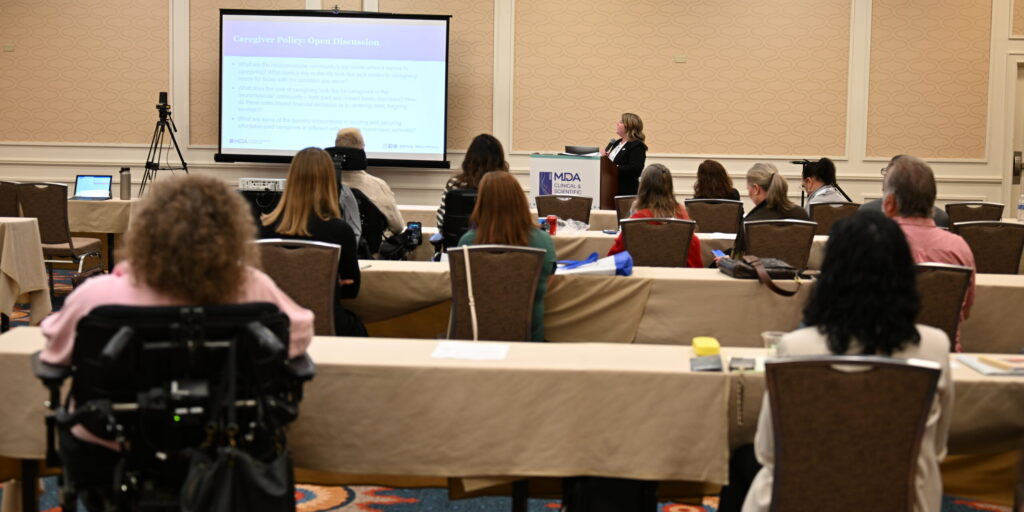
Understanding Creatine Kinase Levels and Testing
By Chris Anselmo | Friday, November 22, 2024
On the neuromuscular disease diagnostic journey, physicians will frequently order a creatine kinase test. This article explains what it is, how it’s used, and how to navigate next steps if the test suggests an underlying disease.
Throughout this article, Quest Media will share advice from clinicians and members of the neuromuscular disease community to help you navigate this process.
What is creatine kinase?
Creatine kinase (CK) is an enzyme found primarily in muscles that is released into the bloodstream as the result of muscle degeneration. This makes CK a useful biomarker for physicians to use to determine if there is an underlying muscle disease, injury, or inflammation.
How is the CK test used?
Many, but not all, neuromuscular diseases have elevated CK levels. (Two examples are Duchenne Muscular Dystrophy and Emery Dreifuss Muscular Dystrophy.) This can alert doctors to the presence of a muscle disease, sometimes even before outward symptoms are present. A CK test is often given as part of an initial clinical examination, after a doctor reviews a patient’s medical history and conducts a physical exam.
A normal CK level range is between 22-198 U/L (units per liter). However, for those with a neuromuscular disease, the levels are often significantly higher, ranging from several hundred, to in some instances, tens of thousands U/L.
Based on the results of the CK test, if it’s elevated, a doctor may be able to make a clinical diagnosis, but sometimes, further testing is required if the diagnosis isn’t clear.
If you’d like to learn more, in Simply Stated: The Creatine Kinase test, Dr. Sharon Hesterlee, MDA’s chief research officer, provides additional information on the biological role of CK, and how physicians use the test to reach a diagnosis.
Navigating the diagnostic journey
The diagnostic journey can be a confusing time for individuals and families. Quest Media has several articles to help demystify this process:
What’s the Difference Between a Clinical and Genetic Diagnosis? provides an overview of the two types of diagnoses — clinical and genetic — and how they’re used. According to Dr. Margherita Milone, a neurologist at the MDA Care Center at the Mayo Clinic in Rochester, Minnesota, “Many patients with muscle diseases share common symptoms, like muscle weakness, fatigue, muscle pain, or muscle cramps. However, there are many types of muscle diseases.” This can make a timely diagnosis tricky. Depending on a host of factors, which the article summarizes, a clinical or genetic diagnosis might be most relevant for your situation.
If you are considering genetic testing, a genetic counselor can accompany you through the process. These experts empower individuals and families to make well-informed decisions about their health and the implications of receiving a genetic diagnosis. In What do Genetic Counselors Do?, hear from genetic counselors about what to expect in a visit and how they can help.
There are many types of neuromuscular disease, each presenting different combinations of symptoms, ages of onset, and underlying genetic causes. In Simply Stated: Revisiting Muscular Dystrophy, Dr. Hesterlee reviews the most common types of muscular dystrophy, and the array of diagnostic tests that can help diagnose these diseases. Key Diagnostic Tests for Neuromuscular Diseases goes into greater detail about these tests, including the CK test.
If you’re still feeling unsure about how to navigate the diagnostic process, 6 Questions to Ask Your Doctor to Get a Diagnosis can help. MDA ambassador Amy Shinneman, who lives with Bethlem Myopathy, and pediatric neurologist Dr. Jena Krueger share the most important questions you should ask your care team at your next appointment. Asking these questions could make a difference in shortening your diagnostic journey.
Why is a diagnosis so difficult?
If you or a loved one has a high CK level, but still lack a definitive diagnosis, this uncertainty can leave more questions than answers and can be incredibly frustrating. In Why is it So Hard to Get a Diagnosis?, MDA care center experts explain why some neuromuscular diseases are tricky to diagnose. According to neurologist Dr. Ericka Greene, “Compared with common diseases, patients with neuromuscular diseases often are delayed in getting a confirmed diagnosis due to a variety of factors, ranging from the barriers to access within the healthcare system to specific patient factors, including social determinants, and the disease itself.” The article shares what you can do to help mitigate these barriers.
Many members of the MDA community have experienced challenging diagnostic odysseys and their personal stories can help others in their search for a diagnosis. In Navigating the Long Journey to a Rare Disease Diagnosis, Aimee Zehner shares her 38-year journey to receiving a Myasthenia Gravis diagnosis, and MDA ambassador Amy Shinneman recounts her road to a diagnosis of Bethlem Myopathy at age 44.
Receiving a diagnosis brings its own challenges
When an elevated CK level leads to a neuromuscular disease diagnosis, it can come as a major shock. While receiving a diagnosis can bring feelings of relief and better understanding, especially after a long diagnostic journey, it can also bring myriad new emotions and questions.
If you’re struggling to come to terms with your diagnosis, MDA care center experts share helpful advice in Coping With a Difficult Diagnosis: Your Emotions Are Normal. One useful suggestion is to change your view — how you deal with your emotions depends partly on how you think about them. According to Julianne Meiser, MSS, LSW, a social worker at the MDA Care Center at Children’s Hospital of Philadelphia, “To process your emotions healthily, you first need to accept all the negative and positive things you feel. Then you can learn ways to reframe perspectives you find troubling.”
For parents of children diagnosed with a neuromuscular disease, the guilt can be overwhelming. In How to Cope When Your Child is Diagnosed, experts share different ways to process your emotions. For example, it’s important not to beat yourself up. “‘Guilt is a common and powerful emotion for parents,’ says Cory Smid, MGCS, CGC, a genetic counselor at the MDA Care Center at University of Wisconsin Health. ‘Many neuromuscular diseases diagnosed in infants and young children are hereditary, and parents can feel it’s their fault. But no one picks what genes are passed on.’”
Communicating about a neuromuscular disease is another challenge many people face. If you’re struggling to let people know about you or your loved one’s disease, Talking About a Diagnosis is a Personal Decision provides useful strategies from MDA community members Jodi O’Donnell-Ames and Sabrina Johnson, along with clinical social worker Rebecca Axline.
Coping with your diagnosis
One of the most effective ways to navigate what comes next is to read stories from the MDA community. Many people have been in your shoes and understand what you’re going through:
In Finding Freedom in Accepting My Disability, MDA ambassador Becca Ball-Schaller shares how she learned to cope with her Bethlem myopathy diagnosis and focus on the positives. “Embracing my disability actually opened up my world…My quality of life has significantly improved since I stopped trying to power through or hide my disability.”
In Learning to Manage the Grief of a Progressive Disease, MDA community members Billy Zureikat and Chris Anselmo share their experience learning to move forward after their diagnoses. Says Chris, “There’s nothing easy about losing an ability, but it can be managed. The loss does not have to take over your life. It doesn’t have to consume you.”
In Five Things You Should Know When Diagnosed With Neuromuscular Disease, Billy shares additional life lessons that he learned from his diagnosis, one of which is the importance of asking for help. “I always tried to do it alone. Unfortunately, that’s not possible and it could do more harm than help…Whether it’s a mobility aid, a handicap placard, or a helping hand, it’s okay accept the help.”
Navigating expert care for neuromuscular diseases
Many members of the MDA community are seen at MDA Care Centers, which are multidisciplinary neuromuscular clinics at leading hospitals around the country that provide quality, expert care. In one day, patients can see their entire care team, including neurologists, physical therapists, pulmonologists, occupational therapists, social workers and other experts. In MDA Care Centers: A National Network of Expert Care, learn more about how these vital centers work.
It is also important to develop skills in advocating for yourself and your medical needs with your doctors and healthcare teams outside of the Care Center. Advocating for yourself when you are in a healthcare setting means communicating what you need or want to the doctors, nurses, and other providers who can help you get it. Hear from individuals living with neuromuscular disease and doctors on how you can advocate for yourself and what you can do to prepare for medical appointments in How to Speak Up for Your Healthcare Needs in Hospitals and Doctors Offices,
Remember that you are not alone
A neuromuscular disease diagnosis can be an isolating experience, but there is an entire community to offer support, resources, and camaraderie. There are numerous ways to connect with others in the neuromuscular disease community, both virtually and in person, through online groups, MDA programs, community events, and more.
Cultivating a one-on-one relationship with someone who shares elements of your own experience and/or lives with the same diagnosis is a powerful and valuable way to connect and grow together. The MDA Connections program seeks to connect newly diagnosed individuals and family members with mentors in the community who understand what they’re going through. MDA mentors who participate in this program bring a wealth of lived experience and knowledge and are eager to support you on your journey. Peer connections are made by MDA Care Specialists, who aim to connect individuals with shared diagnoses and demographics. If you’d like to connect with a mentor in the MDA community, reach out to the MDA Resource Center at 1-800-572-1717 or resourcecenter@mdausa.org.
Virtual programs, like MDA Let’s Play, educational programs, and support groups are other opportunities to connect with members of the community online. MDA also offers a variety of in-person events and programs designed for community connection. MDA Summer Camp and MDA Family Retreats are specifically designed to create experiences the cultivate connection, friendship, and community.
Next Steps:
- Learn more about neuromuscular disease with this A-Z list of neuromuscular diseases under the MDA umbrella
- Find up-to-date disease specific information in the Simply Stated Archive
- Learn more about common medical terminology you need to know.
- Find an MDA Care Center near you.
- Connect with the MDA Resource Center for resources, guidance, advice, and more information about MDA programs.
Next Steps and Useful Resources
- Read more about creatine kinase.
- Stay up to date on Quest content! Subscribe to Quest Magazine and Newsletter.
Disclaimer: No content on this site should ever be used as a substitute for direct medical advice from your doctor or other qualified clinician.




